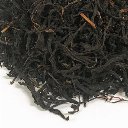Tea: Japanese Black Tea
A Black Tea from Simpson & Vail - ![]() Organic
Organic
| Brand: | Simpson & Vail |
| Style: | Black Tea |
| Region: | Japan |
| Caffeine: | Caffeinated |
| Loose? | Loose |
| # Ratings: | 2 View All |
| Product page: | Japanese Black Tea |
Reviewer: Alex Zorach

✓ 1453 teas reviewed
✓ 501 of Black Tea
✓ 954 of Pure Tea (Camellia sinensis)
✓ 42 of Simpson & Vail
✓ 65 from Japan
Review of Japanese Black Tea
November 18th, 2022
| Aroma | Flavor | Value | Total |
| 9 of 10 | 5 of 5 | 5 of 5 | 97 of 100 |
| Superb | Excellent | Outstanding |
I was really impressed by this tea. I found it delightful, and also easy to brew and easy to drink. Smooth, aromatic, and pleasing in flavor. I've only ever tried one other black tea from Japan, but this one was by far the better of the two, and ranks among the top-tier black teas I've sampled from any region.
The dry leaf is relatively plain, but pleasing looking, and it has an intense fragrance of sweet baked goods, like pastries. The smell strongly reminds me of the Kenya Milima tea from Harney & Sons, which is interesting because it's from a completely different region. I also once had a Darjeeling White tea from Okayti estate that had this aroma.
Once brewed, it tastes absolutely delightful. The sweet pastry notes come out, and the aroma is also floral and fruity, both strong and delicate. The flavor is bold and strongly sweet, even without adding any sweetener, but there is also depth and balance, with some pleasant bitterness. The combination of floral aroma and sweetness makes it taste as if honey has been added. Although it's smooth overall, there is just enough astrigency to impart some body. Overall, very clean tasting. Although the leaf looks dark, the tea tastes much lighter, a lot like an oolong.
This tea seemed strongly caffeinated; I'm sensitive to caffeine and I felt it a lot after drinking it, but it didn't make me jittery. But be mindful that the smoothness of this tea is deceptive: it has quite a caffeine kick to it.
Resteeps very well; the character of the cup changes a lot. The caffeine mostly seems to come out in the first cup, for some reason, but the "darker" characteristics seem to come out more in the second cup, especially if the first steep is 3 minutes or shorter. I.e. the second cup is often more tannic, less sweet, and the aroma has a more malty character and overall is more like a black tea and less like an oolong, white tea, or first-flush Darjeeling the way the first cup is. One thing I absolutely loved is that the second cup seems to develop a more complex aroma, which is a bit unusual. There were herbaceous notes and a strong wintergreen note which is one of my favorite qualities in tea, and I only noticed that in the second steep.
The price is surprisingly reasonable; I would expect a specialty tea like this, especially one of such top quality, to be pricier, but at $16.15 for 4 ounces, this is pretty affordable, especially given how well it resteeps.


